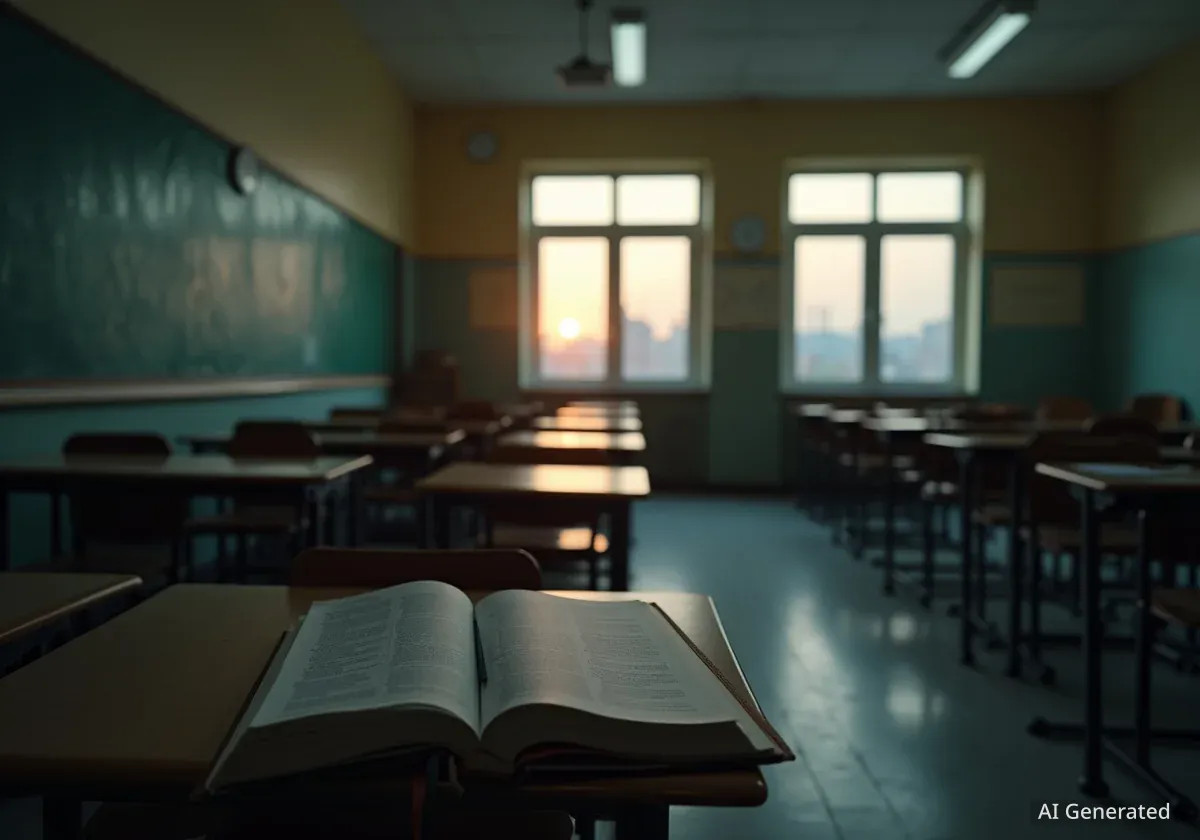Public satisfaction with the quality of K-12 education in the United States has fallen to an all-time low of 35%, according to a new poll from Gallup and the Walton Family Foundation. This figure represents a significant eight-percentage-point decrease from the previous year and is one point lower than the previous record lows recorded in 2000 and 2023.
The findings, based on surveys conducted in August, reveal widespread concern about the direction of the nation's schools and their ability to prepare students for the future. A large majority of Americans believe the K-12 system is heading in the wrong direction, and they give low marks for how well schools equip students for college and the workforce.
Key Takeaways
- Only 35% of U.S. adults are satisfied with K-12 education quality, a new record low.
- Just 26% of Americans believe the K-12 education system is headed in the right direction.
- A minority of the public rates schools as "good" or "excellent" at preparing students for jobs (21%) or college (33%).
- Parents of K-12 students report much higher satisfaction (74%) with their own child's education compared to the national system.
A Historic Decline in Public Confidence
The latest poll, conducted from August 1-20, highlights a deepening pessimism about the state of American education. The 35% satisfaction rate is a combination of 7% who are "completely satisfied" and 28% who are "somewhat satisfied." Conversely, 62% of respondents expressed dissatisfaction, with 38% being "somewhat dissatisfied" and 24% "completely dissatisfied."
This level of discontent is well below the historical average of 45% satisfaction since Gallup began tracking this metric in 1999. Public satisfaction has rarely surpassed the 50% mark, doing so only in 2004 (53%) and 2019 (51%).
Historical Context
Previous low points in public satisfaction with K-12 education occurred during the 2000 presidential election, when education was a central campaign issue, and again in 2023. These periods often coincide with heightened political focus on school policies and performance.
The recent decline appears to be linked to broader concerns about academic performance. This sentiment follows the release of the National Assessment of Educational Progress (NAEP), often called the "Nation's Report Card," which showed significant drops in student reading and math scores since 2019.
Political Divides Shape Perceptions
Party affiliation continues to be a strong predictor of attitudes toward education. The latest drop in satisfaction was driven primarily by Democrats and independents. Satisfaction among Democrats fell by 12 percentage points to 42%, nearly matching their previous low of 41% in 2003. Independents' satisfaction dropped eight points to 34%, their lowest level on record.
Meanwhile, satisfaction among Republicans remained relatively stable at 29%, which is statistically similar to last year's 31%. Historically, satisfaction levels often shift based on which political party controls the White House.
"Americans’ satisfaction with K-12 education has generally been influenced by their party identification, with higher levels of satisfaction seen among Republicans and Democrats when their party occupies the White House," the Gallup report notes.
Schools Seen as Headed in the Wrong Direction
A separate online survey conducted by Gallup from August 1-15 provides further insight into public sentiment. An overwhelming 73% of U.S. adults believe K-12 schools are heading in the wrong direction, while only 26% feel they are on the right track.
These views were consistent across political party lines. However, there were slight differences based on age and education level. Younger adults aged 18 to 29 (31%) and those without a college degree (28%) were marginally more likely to say schools are headed in the right direction compared to their older, college-educated counterparts.
Workforce and College Preparedness Ratings
- Workforce Preparation: Only 21% of Americans rate schools as "excellent" (2%) or "good" (19%). A combined 78% rate them as "fair" or "poor."
- College Preparation: Ratings are slightly better, with 33% giving "excellent" (4%) or "good" (29%) marks. Still, 66% view the preparation as just "fair" or "poor."
Democrats and young adults were the demographic groups most likely to give positive ratings for how well schools prepare students for their futures, though even within these groups, the ratings remained low.
Parents' Views on Their Own Child's Education
A notable contrast emerges when parents are asked about their own child's school. While general satisfaction with the U.S. system is at a record low, parents of K-12 students remain broadly satisfied with the education their children are receiving.
Approximately 74% of parents reported being "completely" (32%) or "somewhat" (42%) satisfied with their oldest child's education. This figure is consistent with the long-term average of 76% since Gallup first asked this question in 1999. When asked for reasons, parents most frequently cited the quality of teachers and the curriculum.
Parental Optimism in Context
Although parents' overall satisfaction with the national K-12 system (39%) is similar to that of the general public, they are slightly more optimistic on specific measures:
- Direction of Education: 33% of parents say U.S. education is headed in the right direction, compared to 26% of all adults.
- Workforce Preparation: 30% of parents give schools a positive rating, versus 21% of all adults.
- College Preparation: 41% of parents rate schools positively, compared to 33% of all adults.
Despite being more positive than the general population, a majority of parents still do not give high marks to the nation's schools for preparing students for work or college. The data suggests a growing crisis of confidence in whether the U.S. school system is adequately equipping young people with the skills needed for life after high school.





